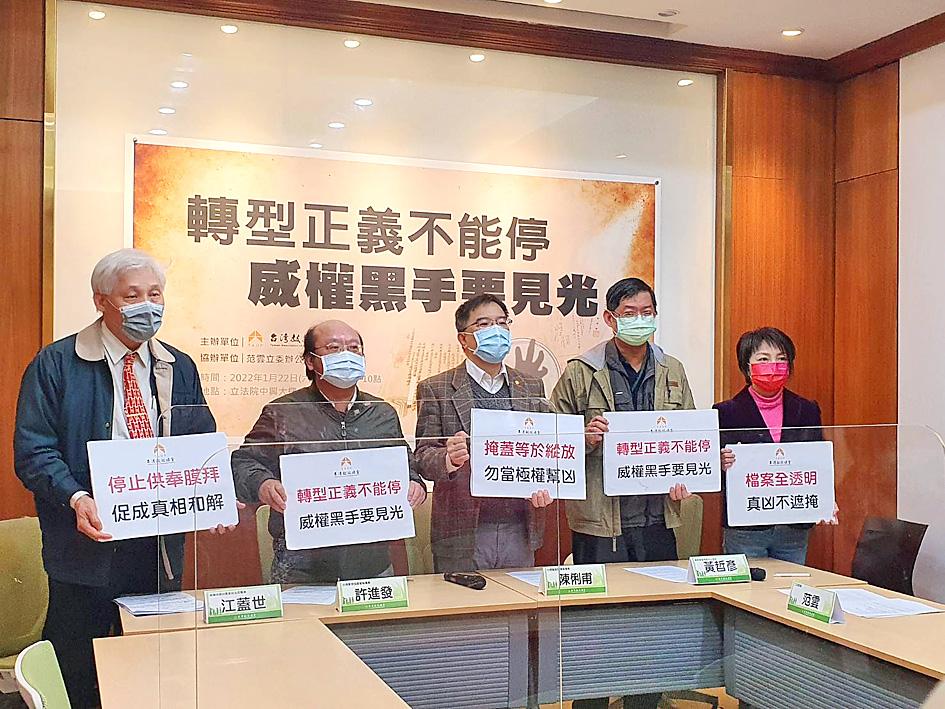The Taiwan Association of University Professors yesterday urged the government to continue transitional-justice efforts after the Transitional Justice Commission completes its term in May.
The commission was established in May 2018 under the Act on Promoting Transitional Justice (促進轉型正義條例).
The Act says that the committee is to expire after completing its tasks within two years, adding that the it could request a one-year extension, which Premier Su Tseng-chang (蘇貞昌) approved in May last year.

Photo: Chien Hui-ju, Taipei Times
At a news conference in Taipei, the association said that transitional justice efforts “must not cease,” as many victims of the White Terror era awaiting justice.
Many of members of the Chinese Nationalist Party (KMT) who perpetrated injustices during the era have also avoided responsibility for their crimes, it said.
During the White Terror era, the National Security Bureau recruited informants in schools, companies and other organizations, whose reports on others often led to miscarriages of justice, association deputy chairman Chen Li-fu (陳俐甫) said.
There were also others wrongly accused of being informers, and many who were forced to do so against their will, it said, adding that many documents have not yet been found, which could provide evidence in some people’s defense.
“Those records that remain hidden would implicate those responsible. If the records remain unseen, the guilty could evade responsibility,” it said. “The government must develop a plan for someone to take up the baton from the Transitional Justice Commission.”
Democratic Progressive Party Legislator Fan Yun (范雲) said that many of today’s disputes are related to the incomplete nature of transitional justice.
One area where the commission has seen progress is in the pacification of judicial lawlessness, she said, adding that efforts are lagging regarding the removal of symbols of authoritarianism and uncovering historical records.
“The top priority is to define who would finish these tasks. Each competent authority should have a clear direction on this,” she said.
Making government archives fully transparent and accessible to the public would be an important step toward gaining public trust, she said, adding that uncovering historic truths was the only way to achieve reconciliation for victims of past injustices.

The Ministry of Foreign Affairs (MOFA) yesterday voiced dissatisfaction with the Comprehensive and Progressive Agreement for Trans- Pacific Partnership (CPTPP), whose latest meeting, concluded earlier the same day, appeared not to address the country’s application. In a statement, MOFA said the CPTPP commission had "once again failed to fairly process Taiwan’s application," attributing the inaction to the bloc’s "succumbing to political pressure," without elaborating. Taiwan submitted its CPTPP application under the name "Separate Customs Territory of Taiwan, Penghu, Kinmen and Matsu" on Sept. 22, 2021 -- less than a week after China

THE GOOD WORD: More than 100 colleges on both sides of the Pacific will work together to bring students to Taiwan so they can learn Mandarin where it is spoken A total of 102 universities from Taiwan and the US are collaborating in a push to promote Taiwan as the first-choice place to learn Mandarin, with seven Mandarin learning centers stood up in the US to train and support teachers, the Foundation for International Cooperation in Higher Education of Taiwan (FICHET) said. At the annual convention of the American Council on the Teaching of Foreign Languages held over the weekend in New Orleans, Louisiana, a Taiwan Pavilion was jointly run by 17 representative teams from the FICHET, the Overseas Community Affairs Council, the Steering Committee for the Test of Proficiency-Huayu, the

A home-style restaurant opened by a Taiwanese woman in Quezon City in Metro Manila has been featured in the first-ever Michelin Guide honoring exceptional restaurants in the Philippines. The restaurant, Fong Wei Wu (豐味屋), was one of 74 eateries to receive a “Michelin Selected” honor in the guide, while one restaurant received two Michelin stars, eight received one star and 25 were awarded a “Bib Gourmand.” The guide, which was limited to restaurants in Metro Manila and Cebu, was published on Oct. 30. In an interview, Feng Wei Wu’s owner and chef, Linda, said that as a restaurateur in her 60s, receiving an

Kaohsiung Mayor Chen Chi-mai (陳其邁) on Monday announced light shows and themed traffic lights to welcome fans of South Korean pop group Twice to the port city. The group is to play Kaohsiung on Saturday as part of its “This Is For” world tour. It would be the group’s first performance in Taiwan since its debut 10 years ago. The all-female group consists of five South Koreans, three Japanese and Tainan’s Chou Tzu-yu (周子瑜), the first Taiwan-born and raised member of a South Korean girl group. To promote the group’s arrival, the city has been holding a series of events, including a pop-up